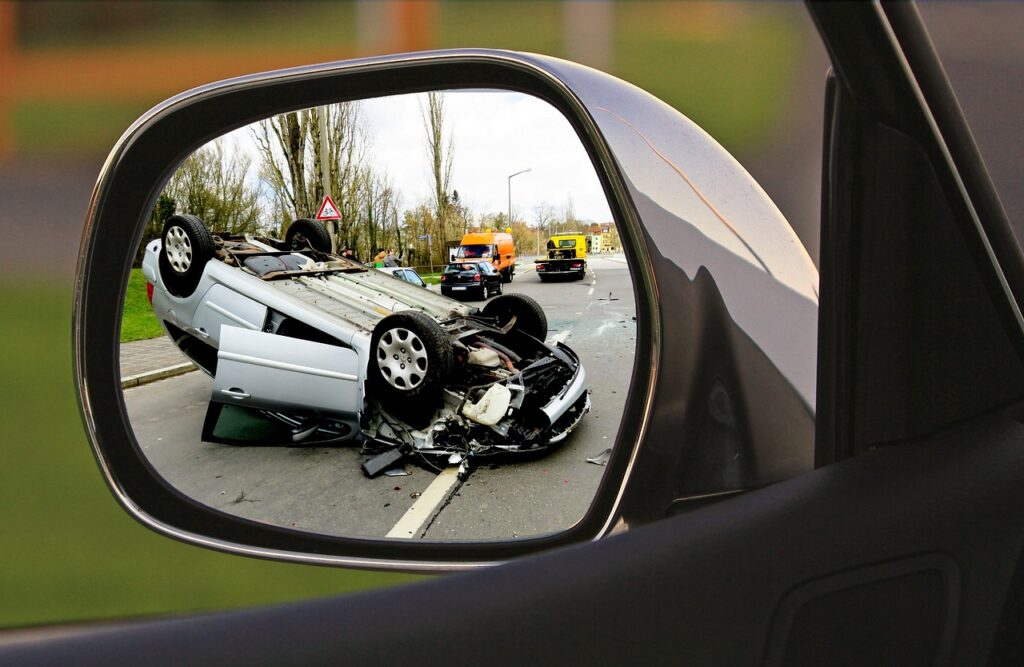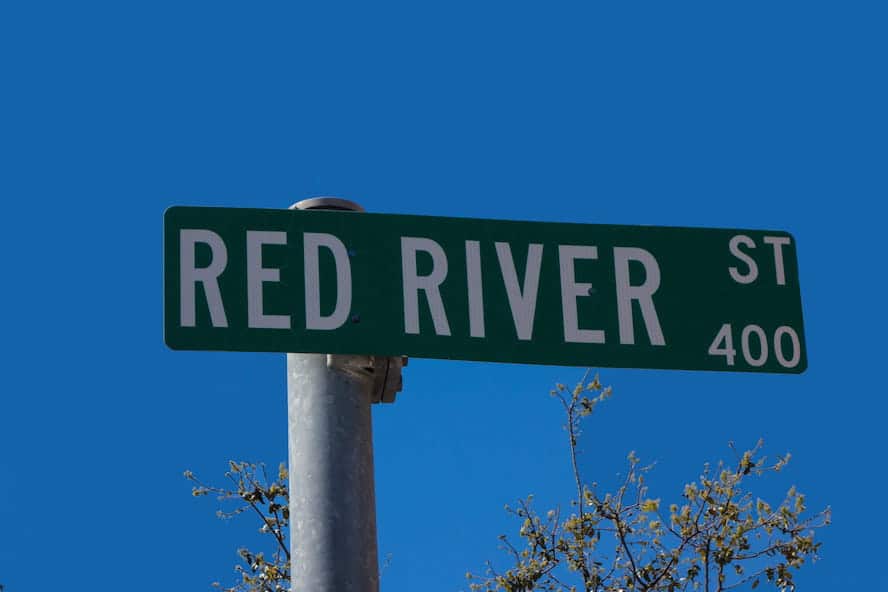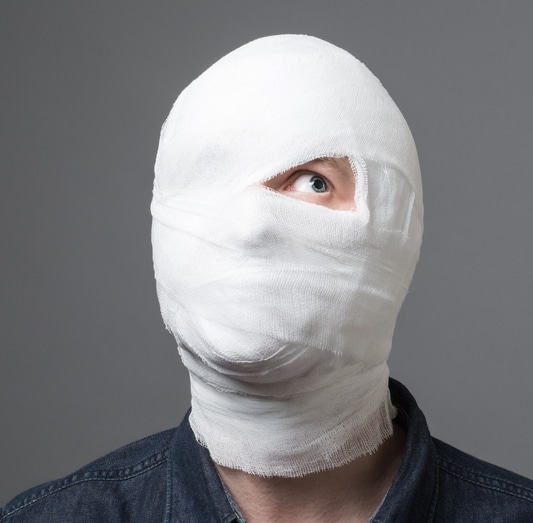If you’ve been injured due to someone else’s negligence or harmful act, you may have questions about personal injury claims.
We already published our common personal injury terms, but in this article, we’ll cover the most frequently asked questions related to personal injury in Austin for 2023. Jump ahead to the section you want to read:
 Personal Injury Basics
Personal Injury Basics
What is a Personal Injury?
A personal injury, also known as bodily injury, refers to any physical or mental harm caused to a person due to someone’s negligence or harmful action. A personal injury occurs when someone is hurt due to another’s negligence, resulting in legal liability and potential financial compensation for the victim.
What Type of Case Is a Personal Injury?
A personal injury case is a civil lawsuit where the victim seeks compensation for their injuries from the responsible party.
How Do I Know If I Have a Personal Injury Claim?
To have a personal injury claim, you must meet four criteria:
- There must be negligence by the other party
- You must have suffered physical or certain specific mental injuries.
- There needs to be someone worth going after. Insurance, assets, etc. Can’t squeeze blood from a turnip.
- You must file the claim within the statute of limitations. Two years from the date of the negligence or discovery of the negligence.
What Should I Do After A Personal Injury Accident?
After a personal injury accident, take photos of your injuries, get witnesses names and contact information, seek medical attention if you haven’t already, and DO NOT post anything online and/or social media about your accident. Call us immediately so we can guide, advise, an begin the preservation of evidence.
Do I Need an Attorney?
If you’ve been injured due to someone else’s negligence, it’s essential to seek the help of a personal injury attorney. We will assist you in understanding your rights and ensure you receive fair compensation for your injuries, including medical bills, lost wages, and car repair expenses.
How Long Do I Have to File a Personal Injury Claim?
In the state of Texas, the personal injury statute of limitations is two years. That means you have no more than two years from the date of the accident to file a lawsuit against the person or entity responsible for your injury. There are certain cases that allow for two years which commences from the discovery of a negligent act, but those are very rare.
I Have Been Injured In A Car Accident. How Can I Best Prepare My Case?
If you’ve been injured in a motor vehicle collision, seek medical treatment immediately. Call the police to the scene, and keep all medical bills and expenses documented, take photographs of your injuries and car damage, get all witnesses names, stay off social media and do not post anything about your case online. Contact a personal injury attorney to discuss your case.

Central Texas Medical Treatment and Personal Injury Cases
What If I’m Just a Little Sore – Not Hurt?
Feeling sore after an accident likely means you are injured. It’s essential to consult your doctor for a proper evaluation. Avoid toughing it out and not seeing a doctor, as it might give the insurance company a reason to deny your injury claim. Shock and adrenaline can mask the pain of accident trauma initially.
Do I Have To Go To An MD?
No, you don’t have to visit your primary care physician for treatment after an accident. You can seek treatment from other healthcare professionals like chiropractors or acupuncturists. It’s advisable to go to the hospital after an accident, even if you don’t feel hurt, as injuries might not be immediately apparent.
I Was Injured But It’s Not Too Bad. Should I See A Doctor?
It is not uncommon for people not to feel injured immediately after an accident. Symptoms may develop later, and seeking medical attention is crucial to ensure your well-being. Even if you believe you can function without treatment, it’s essential to see a doctor to assess the full extent of your injuries and avoid potential complications in the future.
 What To Expect When You File a Personal Injury Case
What To Expect When You File a Personal Injury Case
What is the Personal Injury Claim Process?
You begin and complete your medical treatment. That is a concept called MMI, Maximum Medical Improvement. It means, you are as good as you are going to get. You may never be 100% again, but then again, you may not have started at 100%. Once you reach MMI, we will get your final medical bills and records from ALL your medical providers. This includes the initial Ambulance bills, ER bills, Xray, Mri, Surgical, Pain Management, Chiropractic, Massage, etc. We will also obtain all lost wages from your employer, and if you are self employed we will get tax returns to assess the damage to your earnings. Then a detailed demand package goes out to and is sent to the defendant and/or their insurance company. We settle 80-95% of our cases after this demand package is sent. The ones that don’t settle need to be filed in a formal lawsuit, usually in District County court.
What Happens When We File My Personal Injury Case?
The personal injury claim process starts with filing a summons and complaint in the appropriate Texas court. This initiates the case. After filing, you serve the defendant with the documents, including your complaint outlining the grounds for your case and your demands for recovery.
After filing the case, both parties exchange documents and build their evidence. Mediation is required step in the trial process and most cases settle here. Your attorney may attempt to reach a settlement or settle it in mediation, but if it doesn’t work out, the case will go to trial. Most car wreck trials last 2-3 days and more complicated cases can go 1-2 weeks.
What Happens in a Personal Injury Lawsuit?
In a personal injury lawsuit, the victim files a complaint, and the defendant responds. Both sides build their evidence, attempt a settlement, and if not successful, the case goes to trial.
Do I Have to Go to Court?
Not necessarily. Most personal injury claims are settled with the insurance company without going to court. Only a small percentage of cases end up in litigation and even fewer end up in court.
What Is the Statute of Limitations in Texas?
The statute of limitations in Texas is two years from the date of the accident for most accident cases.
Will My Personal Injury Case Go to Trial?
Most personal injury cases settle before trial. Only a minority of cases end up going to trial when there are disputes over facts or legal issues. Building a strong case can increase the chances of reaching a settlement.
How Long Does a Personal Injury Lawsuit Take to get a Settlement?
The time to settle a personal injury lawsuit can vary widely, from a few months to over a year, depending on the complexity of the case and willingness to settle. The main factor in the time it takes to settle the case is your ability to medically heal. We don’t want to settle the case until you are fully healed because once you settle the case there is not going back for future medical bills.
 Benefits Of Hiring A Personal Injury Lawyer
Benefits Of Hiring A Personal Injury Lawyer
How Can an Attorney Help?
An experienced attorney can guide you through the legal process, build a strong case, and work towards getting you the maximum compensation possible.
When Should I Hire a Personal Injury Attorney?
You should consult a personal injury attorney as soon as possible after the accident. They will protect your interests and ensure you don’t settle for less than you deserve.
How Much Does a Personal Injury Lawyer Cost?
We work on a contingency fee basis, meaning we only get paid a percentage of the recovery if you win your case. There is never any up front fees. We front all case expenses, and expert fees, and even court costs. Only if we win, do those fees come out of your recovery. We even have doctors/chiropractors/image companies (MRIs/CTs/etc) that are willing to take our word that the case is a good one and will not charge you any fees until the case resolves. We take the risk, you have been through enough.
Can I File a Civil Lawsuit Without an Attorney?
Can you rewire your home’s whole electricity circuitry?; the better question is, would you? Of course not, unless you are an electrician, you would not do it; its simply not your area of expertise. You would be wise to hire a licensed capable electrician. So can you file a lawsuit without an attorney?; sure, but you would not be wise to do so. You would be battling an experienced lawyer on the other side and that can be an uphill battle. Having said that, give me a call and if the case is small and simple enough and can be filed in Smalls Claims Court, I may advise you to file it on your own. Small Claims Court was designed to file without the use of a lawyer. The maximum limit you can file for is $10,000 which may not be enough for your case. If the other side has insurance, they will have a lawyer on their side, even in small claims court and your chances of success will diminished. Be smart, don’t rewire your house and don’t go forward with a legal claim without sound advice from a qualified attorney.
 Personal Injury Payouts
Personal Injury Payouts
How Much is My Personal Injury Case Worth?
In a personal injury claim, you may be entitled to special types of damages in Texas, including reimbursement for medical expenses, lost wages, and property damage. You may also be entitled to non-economic damages like pain and suffering and emotional trauma.
Does Pain and Suffering Include Medical Bills?
No, pain and suffering compensation is separate from medical bill compensation.
What Is Fair Compensation for Pain and Suffering?
Fair compensation for pain and suffering depends on the severity and permanence of injuries. Fair is a subjective term and is really defined as what the person paying deems as fair. Negotiating for Pain and Suffering is an art form which we have mastered after 20+ years of practice in Austin.
What Is the Average Settlement for a Personal Injury Case?
This is a loaded question. It depends on numerous factors. Injuries, life impact both medically and financially, type of insurance on the other side, damage to vehicle, etc, etc. This list is 100+ factors deep. My best answer is…As much as we can get you!
What Is the Average Payout for Whiplash in Texas?
As much as we can get you! There are over a hundred factors that we factor in to determine the value of your case. This is an impossible question to answer without plugging in those hundreds of factors.
How Do I Maximize My Personal Injury Settlement?
Maximize your settlement by building strong evidence, understanding the categories of damages in Texas, getting consistent and credible medical treatment, and listening to your attorney.
 What About My Unique Situation?
What About My Unique Situation?
How Long Are Judgments Good for in Texas?
A Texas judgment is valid for 10 years once it has been signed by a judge. It can be renewed indefinitely. A judgment can go dormant after those 10 years have elapsed, but you can revive it by filing a motion with the court.
Is Texas a Comparative Negligence State?
Texas uses a modified comparative negligence system for personal injury cases, which means you can pursue compensation for your injuries and other losses as long as your level of fault is 50 percent or less.
What Happens if I’m Partially at Fault for the Accident?
Texas follows comparative negligence, meaning you can still recover compensation even if partially at fault. Your recovery will be reduced by the percentage of your fault. If you were less than 50% responsible for the accident, you can still file a personal injury claim and seek compensation. However, your award may be reduced to reflect your partial responsibility.
Can I Sue a Government or a City?
Yes, you can sue a government or city for their negligence or the negligent actions of their employees; assuming that the doctrine of sovereign immunity does not apply. The most typical cases against governmental agencies are car accidents and civil rights violations. However, claims involving governments have different notice requirements. These lawsuits come with VERY detailed and complicated requirements. Call a lawyer immediately.
 Personal Injury and Insurance Claims in Texas
Personal Injury and Insurance Claims in Texas
Can I Trust The Insurance Adjuster?
Absolutely Not! Insurance companies spend a lot of time and money on friendly advertising. The “at-fault” driver’s insurance company is experienced at handling auto accident claims and their goal is to settle your claim as cheaply as possible. It is how insurance companies stay in business. You should hire an attorney to represent your interests.
Do Adjusters Only Believe My Injuries If I Go To A Doctor?
Being treated by an MD is not a requirement for filing a valid personal injury claim. However, some injuries do not show symptoms immediately. It is critical to be evaluated by a doctor to diagnose all injuries and to start receiving appropriate medical care. The doctor will also create medical records that can be important evidence at a later date.
Your job is to get well. The most important thing for you to do is recover from your injuries as quickly as possible so that you can return to your normal life.
How Do I Get My Car Fixed?
Contact the Property Damage adjuster with the at-fault driver’s insurance company handling your claim. Discuss only the Property Damage claim with the adjuster. Make arrangements for your car’s assessment after the adjuster admits liability. Consult your attorney along the way and we will make sure that you are getting a fair amount for your car. Your lawyer will also explain the significance of Gap insurance which you may have.
How Is The Value Of My Car Determined?
Most insurance companies use services like Kelley Blue Book or Edmunds to determine the value of your car based on its condition, mileage, options, and other factors.
When Is A Car Considered ‘Totaled’?
A car is considered totaled if the repair cost exceeds its fair market value. That number is usually 70%. So if you have a 10K car and it costs more than $7K to fix, it will be considered totaled.
What If My Car Is ‘Totaled’?
If you receive a fair and reasonable offer, you can accept it, find a new car, and move on. If you’re unsatisfied with the insurance company’s offer, you can provide evidence to the adjuster to justify a higher valuation. Seek independent appraisers if needed or consider filing a claim against the at-fault driver.
What If The Other Driver’s Insurance Adjuster Calls Me?
The insurance adjuster will call you after an accident. Do not speak with the adjuster. Simply refer the adjuster to your insurance company or attorney. It is best not to give any information to anyone other than your attorney. Your attorney will set up the claim and then they will assign a property only adjuster to you. Discuss the car only and not your injuries and or lost wages with the adjuster.
Why Did The Adjuster Call Me?
The insurance adjuster will call you after an accident. Initially, the adjuster may tell you the reason for the call is to conduct a preliminary investigation. At that time, the adjuster may attempt to sound like your friend and even offer to pay your medical bills, which is an indication that the insurance company believes it is liable for an even larger payment to you. If this happens, the adjuster’s real purpose is to convince you to settle your claim for a modest amount of money before you know how seriously you were injured. The insurance company may ask you to sign a Release. Unless you are ready to close your claim, Do Not Sign The Release!
Will The Other Driver’s Insurance Company Pay For My Lost Wages and Medical bills?
It is your responsibility to handle your medical bills lost wages initially. Once the case is settled and or tried, your medical bills and lost wages will be part of that settlement. You will also get pain and suffering on top of all that, which could be quite significant. We have relationships with medical providers that can provide you with care under a Letter of Protection.
 Personal Injury and Auto Insurance FAQs
Personal Injury and Auto Insurance FAQs
I Have ‘Full Coverage.’ What Does That Mean?
All states require every vehicle on the road have a minimum amount of Liability coverage. Each state sets its own standard with minimum coverage, generally beginning at 15/30/15. Texas minimum coverage amount is 30/60/25.
Some people only have “Liability” coverage, which they may incorrectly believe to be “full coverage” because their insurance agent told them they are fully covered under the law. Others assume Liability coverage plus some additional coverage is “full coverage.” Other types of coverage include Collision, Comprehensive, Theft, Towing, Rental, Medical Payments, Personal Injury Protection, and Uninsured Motorist, among others. Though you may have “full coverage”, that may not mean full protection.
Why Should I Buy Uninsured Motorist Coverage?
Every state requires all vehicles be insured, though, as many as 25% of all private passenger cars and small trucks may be uninsured. If you are seriously injured by an uninsured driver you will be able to make a claim against your own insurance company to take care of your injuries. You are not insuring the “at-fault” driver, you are insuring yourself and your loved ones. High matching uninsured motorist coverage is a good buy for you and your family. Uninsured coverage also encompasses Under-Insured coverage. This means that if the at fault driver is Under-insured and your injuries exceed his coverage amount, your Under-Insured coverage kicks in and pays for your excess injuries. I highly recommend this type of coverage.
What Is ‘No-Fault’ Insurance Coverage?
No-fault insurance, also called Personal Injury Protection (PIP) and/or Med-Pay, provides immediate coverage of your medical bills and the medical bills of your passengers no matter who caused the accident. No Fault insurance gets its name as the coverage is not dependent on who caused the accident. Under most “no-fault” or PIP coverage plans, a portion of your lost wages is covered.
What If The ‘At-Fault’ Driver Does Not Have Enough Insurance?
If you are the victim of an accident and the other driver only purchased the minimum required insurance, you may not be fully compensated for your injuries and property damage. The negligent driver’s insurance company would only be responsible for paying up to the policy limits. This most likely would be far less than what you could need to pay your mounting medical bills and to replace your lost wages. Hence you need Under-Insured Motorist coverage on your own policy to cover these situations.
What If The ‘At-Fault’ Driver Does Not Have Insurance At All?
When you file a claim against your insurance company, it is filed under your Uninsured Motorist (UM) coverage. Your insurance company essentially becomes the “at-fault” driver’s liability carrier. At that time, think of your insurance company as the “at-fault” driver’s company, because it will process your claim like it is the “at-fault” driver’s company.
Hopefully, you have UM coverage. In the case of a severely injured person who requires extended hospital care, his or her medical bills may be several times the liability limits on the “at-fault” driver’s vehicle with average coverage. By some estimates, one in four drivers are uninsured. Everyone should have adequate UM coverage. If the uninsured “at-fault” driver hits a car in which you are the passenger, it is your UM coverage that will handle the claim. If your injuries are significant, it may be possible to “stack” insurance.
How Can I Prove The Validity Of My Claim To The Insurance Company?
Insurance companies are more likely to believe people who focus on recovering from their injuries. Documentation, such as medical bills and reports, and accurate proof of lost wages are great ways to prove to insurance companies that an injury exists and has caused losses. Exaggerating the extent of injuries or amount of money lost may cause the insurance company to believe the claim is invalid.
Can I Make The Insurance Company Buy Me A New Car?
Unfortunately, no. They will pay you for the fair value of your totaled car or repair your car and provide you with a diminished value price if a repair is needed.
What Are My Property Damage Rights?
The duty of the insurance company for the “at-fault” driver is put you back in the place you were in immediately before the accident. You are entitled to have your car repaired to its pre accident condition or receive its fair market value.
 Personal Injury and Health Insurance
Personal Injury and Health Insurance
Can I Still Settle Out of Court If Health Insurance Paid My Medical Bills?
Yes, even if your health insurance covered your medical bills, you can still pursue a personal injury claim for the full value of your medical treatment in addition to your pain and suffering and emotional trauma, not just your out-of-pocket expenses. Don’t confuse your health Insurance with the at fault party’s auto Insurance.
Can My Health Insurer File A Lien Against My Case?
Often, yes, though not in all cases. Health insurer liens are subject to complicated reimbursement laws. If there is a lien from a health insurer when the case concludes we will determine if your health insurer is entitled to reimbursement and will request a waiver or negotiate reduced payment of the lien pursuant to the laws protecting injury victims.
Austin Auto Accidents and Personal Injury FAQs
What Can I Be Compensated For In An Automobile Accident?
Automobile accidents are some of the most costly accidents, as they frequently result in serious injuries and damage to property. As with any other accident, a victim will be able to recover medical costs in the event of an automobile accident. Medical costs include all immediate medical procedure as well as any follow-ups, chiropractor, or physical therapy required after the accident. All repair costs to the vehicle or property should also be compensated by the at-fault driver. Lost wages can also be recovered in addition to pain and suffering, emotional trauma, and future lost earning potential are all other claims that will likely be made.
 Are Auto Accidents The Only Type Of Personal Injury?
Are Auto Accidents The Only Type Of Personal Injury?
No, auto accidents are the most common type of personal injury, but there are many other types as well. Personal injury law also covers incidents such as home accidents, boat accidents, motorcycle accidents, airplane crashes, dog bites, train accidents, defective products, birth injuries, slip and fall incidents, inadequate security cases, work injuries, defective drugs, nursing home abuse, wrongful death, and medical malpractice, among others.
I Was Involved In An Automobile Accident, What Should I Do?
If you’ve been in an auto accident, the first priority is to seek medical treatment if you’re injured. Get a proper diagnosis and medical care for your injuries. Take photos of the accident site, the auto damage and take down the other side’s insurance information and ID.
Avoid giving a statement to the other driver’s insurance company without consulting an attorney first. Consider reaching out to an Austin-based car accident lawyer to discuss your claim, as many offer free initial consultations for accident cases.
Other Types of Injury Accident FAQs
I Was Injured Through Someone Else’s Carelessness, What Should I Do?
If you were injured due to someone else’s negligence, gather evidence such as witness statements and photographs of the incident. Get contact information for the responsible party and any witnesses. This documentation will be helpful when making a claim for your injuries.
I Injured My Spine When I Fell Down Slippery Steps, Can You Help?
If you were injured due to a dangerous condition on someone’s property, such as slippery steps, you may have a personal injury claim. Property owners have a duty to warn of dangerous conditions and ensure their property is safe for visitors.
What If The Accident Happened While I Was Working?
If the accident occurred while you were working, you may have a Worker’s Compensation claim. Under Worker’s Compensation coverage, your medical bills will be paid. However, the insurance company may seek reimbursement from your personal injury settlement for the medical expenses they covered.
I Was Injured Years Ago. Now I Have Similar Injuries After This New Accident. Will This Impact My Case?
Yes, it may impact your case. If a previous injury is linked to your current symptoms, the wrongdoer may not be liable for the entire extent of your symptoms. Insurance companies may try to reduce your recovery by attributing some symptoms to your previous injuries. The concept is called “pre-existing injuries”. This is a very common occurrence and we have dealt with this thousands of times. Pre-existing injuries should never deter you from filing a claim.
Can I Be Compensated If I Have A Pre-Existing Condition?
Yes, having a pre-existing condition does not prevent you from recovering compensation for injuries caused by someone else’s negligence. The at-fault party may still be liable if they aggravated your pre-existing condition.
Property Owners and Liability
How Is Someone Considered Liable For A Slip And Fall Injury?
Liability in slip and fall cases depends on the carelessness of the property owner or whether the injured individual caused their own harm. The legally liable party must have caused or known about the dangerous condition. The concept is called, “Actual or constructive knowledge of the defect.”.
A Family Member Died on Someone’s property. Can I Sue The Negligent Party?
Yes, you may have a premises liability case. Property owners can be held liable for injuries if they knew about a dangerous condition on their property and did not correct it.
Texas wrongful death law generally provides that a person is liable for damages arising from an injury that causes an individual’s death if the injury was caused by their wrongful act, neglect, carelessness, unskillfulness, or default.
The action is for the exclusive benefit of the surviving spouse, children, and parents of the victim. A jury may award damages in an amount proportionate to the injury resulting from the death, and the damages will be divided among the people who are entitled to recover. Exemplary damages may be recovered when the death is caused by the willful act or omission or gross negligence of the defendant.
When Are Property Owners Liable For Accidents On Their Premises?
Property owners can be held liable for accidents on their premises if they were negligent in maintaining the safety of their property. The key is whether they took reasonable steps to prevent accidents.
A Neighbor’s Dog Bit My Child. Can I Pursue A Case Against Them?
Yes, you can bring a lawsuit against the homeowner for a dog bite injury. Texas follows a “negligence” approach to dog bites, meaning you must prove that the owner knew the dog was dangerous and didn’t take reasonable care to restrain it.
What Are My Options If I Was Hurt On The Work Site?
If you were injured on the job, you may be eligible for workers’ compensation benefits. These benefits provide income while you are unable to work or work at full capacity. You don’t need to prove your employer’s fault, but you must be diagnosed by a doctor authorized by your employer.
What If My Employer Wants Me To Sign An Agreement?
Never sign anything without consulting a personal injury attorney. Insurance companies may pressure injured workers into signing agreements that could compromise their legal rights and limit compensation. Seek legal advice before signing any documents.
 Medical Malpractice and Personal Injury Cases
Medical Malpractice and Personal Injury Cases
How Can You Prove If I Was A Victim Of Medical Malpractice?
Medical malpractice cases often involve a doctor’s gross negligence leading to further injury. Another medical professional can testify if the doctor didn’t act appropriately during the procedure.
Big Trucks and Personal Injury Accidents
Is The Trucking Company Or The Driver Liable For The Accident?
In many cases, both the driver and the trucking company can be liable. If the driver was acting within the scope of their employment, the trucking company may be responsible for their actions. Work with an Austin-based truck accident lawyer to get more information.
Motorcycles and Personal Injury Accidents
Is A Motorcycle Accident Automatically My Fault If I Was Lane Splitting?
Lane splitting can affect liability in a motorcycle accident, and insurance companies may consider it a contributing factor. However, if the other driver’s actions were more unsafe, you can still seek damages with proper evidence and legal assistance.
I Was Not Wearing A Helmet. Can I Still Recover Damages?
Compensation for head or neck injuries can be challenging to obtain. Generally, motorcyclists must wear helmets, according to Texas law. There are no exceptions for riders under the age of 21. Riders over the age of 21, however, do not have to wear a helmet if they can prove that one of the following is true:
- They have completed an approved motorcycle operator training course.
- They have medical insurance coverage that covers motorcycle accident injuries.
Texas police may not stop a motorcyclist who is riding without a helmet to determine if the rider is complying with state law.
My Motorcycle Accident Was Caused By Another Driver, But Our Vehicles Never Collided. Do I Have A Claim?
Yes, you can raise a claim against the other driver. Even in “no contact” motorcycle accidents, if another driver’s negligence causes your accident, you can seek compensation. We would need to find witnesses, cameras, road conditions, etc to make this claim. No contact collisions are difficult cases because the other side will argue that you simply overreacted to a situation and caused your motorcycle to lose control. You need legal advise asap.
Attorney Payment Questions
Will I Have To Pay My Lawyers At The Conclusion Of My Case?
We take a percentage of the recovery only if there is a recovery. If you don’t win, we don’t get anything.
Other Personal Injury Questions
Where Will My Lawsuit For My Personal Injuries Be Filed
You can file your lawsuit either in the county where the Defendant lives or where his company is based or the county where the incident occurred. We will determine where to file the case based on a variety of factors.
The Person That Caused My Injury Is Claiming That It Was My Fault. What Do I Do?
In cases with unclear liability, an experienced attorney can help determine who caused the injury. It’s crucial to understand that not every case is solely due to one person’s negligence.
What If I Am Suing A Family Member or Friend?
If you were injured at a friend/relative’s house or in a car accident involving a friend or relative, you may wonder if you have to sue your mom/brother/best friend. You don’t want to create bad feelings, right?
In personal injury cases involving friends or relatives, the first step is to work with the insurance companies to seek compensation. If the insurance companies don’t offer fair compensation, your friend or relative may become the named defendant in the case.
In most cases, their homeowner’s or auto insurance will cover the damages and provide legal defense, so their personal assets wouldn’t be at stake.
I Was Hurt By Taking A Prescription Drug, What Should I Do?
If you’ve experienced serious adverse side effects or injury from a prescription drug or over-the-counter medication, you may have a personal injury case. Preserve all evidence, including medical records, receipts, prescriptions, packaging, and any remaining drug. Do not give the drug or packaging to anyone else.
My Baby Was Born With A Serious Injury, Do I Have A Case?
If your baby was born with a serious injury, you may have a birth injury case. In some instances, the injury may have been caused by negligence or malpractice. Compensation can help ease the financial burden caused by the injury and its long-term effects for both the baby and the parents.
Who Brings A Claim On Behalf Of Children That Are Hurt?
In most cases, parents or legal guardians of injured children can file claims on their behalf since minors (under 18) cannot file lawsuits themselves. The parent/guardian may file two separate claims – one for their own losses and one for the child’s injuries.
What If A Person Dies Before Bringing A Personal Injury Lawsuit?
When a person dies before bringing a personal injury lawsuit, it is referred to as a wrongful death case. The surviving spouses, domestic partners, parents, children, siblings, and grandparents can file a wrongful death claim against the responsible party. The type of damages that can be sought depends on the relationship with the deceased and may include financial support, household services, loss of companionship, affection, and burial expenses.
Will The Person Who Caused My Injury Be Punished?
In personal injury cases, the person who caused the injuries is usually not punished with jail time or criminal fines. However, in some cases, the court may award punitive damages to punish defendants who acted recklessly or intentionally against the public’s interest.

Additional Austin Personal Injury Questions
- FAQ: What is tort reform, and how does it apply in Texas?
- Austinites: How Did You Find Your Personal Injury Attorney?
- FAQ: What is my case worth?
- FAQ: How much is a good settlement for a motorcycle accident?
- FAQ: I was injured in a motorcycle accident, but I wasn’t wearing a helmet. Can I still recover damages from the other driver?
- FAQ: I was just in a car wreck. Should I take pictures?
- FAQ: How do I find a good personal injury lawyer?
- The Most Dangerous Intersections in Austin (And What We’re Doing About Them!)
- FAQ: Do I have a personal injury case?
- FAQ: Can you sue someone for causing a car accident?
- FAQ: My loved one was killed in a crash of a homebuilt (kit) aircraft. Does that affect my ability to bring a lawsuit?
- FAQ: What is a Tort?
- In Texas Personal Injury Law, What Is An ‘At-Fault Party’?
- FAQ: Is Texas a Comparative Negligence State?
- FAQ: Is there a statute of limitations on a wrongful death suit?
- Does Texas Have A Statute Of Limitations For Personal Injury Cases?
- FAQ: Special Damages
- FAQ: Who decides where my car is repaired?
- Austin, TX Personal Injury FAQs
- FAQ: What If A Loved One Or Friend Is Responsible For An Injury On Their Property?
- FAQ: What if the vehicle that caused my accident was an Uber or a Lyft?
- FAQ: Do I have to take my car to a repair shop the other driver’s insurance company approves?
- FAQ: Should I see a doctor after an accident, even if I do not feel hurt?
- FAQ: Can I recover damages if I wasn’t wearing a seatbelt at the time of the accident?
- FAQ: The other driver’s insurance adjuster has requested my medical records. Should I release them?
- FAQ: How common are car accidents in Austin?
- FAQ: Who is responsible for damage to my vehicle form hitting a city street pothole?
- FAQ: How can I maximize my compensation in a personal injury claim?
- FAQ: How do I find the right personal injury lawyer for me?
- FAQ: Do you have to accept an insurance settlement?
- FAQ: Is the rear driver always liable for a rear-end collision?
- FAQ: Do I have to call the police after a minor car accident?
- FAQ: Do I have a claim even if my health insurance has already paid my medical bills?
- FAQ: What will I be asked in my deposition?
- FAQ: What kind of evidence is needed in a personal injury claim?
- FAQ: Is the information I share with my attorney confidential?
- FAQ: What if I am injured by an uninsured person?
- FAQ: Should I speak with the At-Fault Party’s Insurer?
- FAQ: What is Maintenance and Cure?
- FAQ: What is a Gross Recovery?
- FAQ: What is Actual Cause?
- FAQ: What is the Burden of Proof?
- FAQ: What is Transferred Intent?
- FAQ: What is Vicarious Liability?
- FAQ: What is an Unconscionable Act?
- FAQ: What is Strict Liability?
- FAQ: What is the Statute of Repose?
- FAQ: What is Respondeat Superior?
- FAQ: What is Reasonable Care?
- FAQ: What are Punitive Damages?
- FAQ: What is Proximate Cause?
- FAQ: What is the Preponderance of Evidence?
- FAQ: What is Loss of Consortium?
- FAQ: What is a Letter of Protection?
- FAQ: What is Just Compensation?
- FAQ: What are Intentional Wrongs?
- FAQ: What is Gross Negligence?
- FAQ: Can I File a Claim Against the Texas Government?
- FAQ: What is Full and Fair Compensation in Texas?
- FAQ: Can you Sue for Emotional Distress in Texas?
- FAQ: What is the Duty to Mitigate Damages?
- FAQ: What is Modified Comparative Fault?
- FAQ: What is a Contingency Fee?
- FAQ: What is a Bad-Faith Claim?
- FAQ: What is an Assumption of Risk?
- FAQ: When can I sue for false advertising?
- FAQ: Is it possible to sue a city or county?
- FAQ: Is Texas a no-fault insurance state?
- FAQ: How long does a Texas judgment last?
- FAQ: What is “full and fair compensation?”
- FAQ: How do I maximize my personal injury settlement?
- FAQ: Will my personal injury case go to trial?
- FAQ: How do I make up for my lost wages until I get my settlement?
- FAQ: How do I pay my medical bills until I get my settlement?
- FAQ: How long will it take to settle my claim?
- FAQ: What if I had a pre-existing condition?
- FAQ: What do I do if an insurance adjuster calls me?
- FAQ: Do I have a case if I do not feel hurt?
- FAQ: How do I know if I have a case?
- FAQ: What is the statute of limitations to file a consumer fraud claim?
- FAQ: What sort of things can be claimed under the Texas Deceptive Trade Practices Act?
- FAQ: What should I do if I think I am a victim of consumer fraud?
- FAQ: When can I sue for deceptive pricing?
- FAQ: Can I sue if I did not purchase anything?
- FAQ: What is the lemon law?
- FAQ: What are the fundamental rights of consumers?
- FAQ: How much can you sue for consumer fraud?
- FAQ: What are the most common types of consumer fraud?
- FAQ: How do injury laws differ between domestic flights and international flights?
- FAQ: What is a “statute of repose” in regards to an aviation accident?
- FAQ: What are the most common causes of an airplane accident?
- FAQ: What sort of injuries are most common in plane crashes and other aviation accidents?
- FAQ: Who can be held responsible for an aviation accident?
- FAQ: How long does an aviation lawsuit take, and how much of my time will it consume?
- FAQ: Should airplane crash victims or their families discuss settlement with the airline or its insurance company?
- FAQ: What roles do the NTSB or FAA play following an airplane crash, and how might that impact me?
- FAQ: How quickly after an airplane accident must I hire an aviation attorney?
- FAQ: How much compensation do you get if you’re in a commercial plane crash?
- FAQ: Someone in another boat caused my injuries, but we didn’t actually collide with one another. Can I still hold that person responsible?
- FAQ: From whom might I obtain compensation for my boating accident injuries?
- FAQ: What are the common causes of boat accidents?
- FAQ: Is my case hurt if I wasn’t wearing a personal flotation device?
- FAQ: Is seeking compensation for a boat accident different from seeking compensation for other types of accidents?
- FAQ: Should I work directly with the insurance companies after a boat accident?
- FAQ: What type of injuries usually happen in a boat accident?
- FAQ: What should I do if I was injured on a boat?
- FAQ: Is it worth getting a lawyer for a minor boat accident?
- FAQ: How long do you have to sue after a boat accident?
- FAQ: Who is liable in a boating accident?
- FAQ: What are potential defenses in dog bite cases?
- FAQ: Can I shoot a dangerous dog?
- FAQ: What is the “one bite” rule? Does it apply in Texas?
- FAQ: What should you do if your dog gets bitten by another dog?
- FAQ: Do I need to see a doctor after a dog bite?
- FAQ: Do I Need a Lawyer for a Dog Bite?
- FAQ: What Damages can I Recover if I am the Victim of a Dog Bite?
- FAQ: What is the Statute of Limitations for Dog Bite Claims?
- FAQ: What has Liability in a Dog Attack?
- FAQ: If Someone’s Dog Jumps on Me, Can I Sue Them?
- FAQ: Can You Sue Someone for Killing Your Pet?
- FAQ: What are common causes of slip and fall injuries?
- FAQ: If a property owner is found responsible for my personal injuries, what can I recover?
- FAQ: If I was assaulted at an apartment complex, can I sue the owner?
- FAQ: Is the store owner responsible if I slip, fall and suffer an injury inside the store?
- FAQ: What if the property owner claims that the risk should have been obvious?
- FAQ: For purposes of seeking just compensation, does it matter where I fell?
- FAQ: Are you liable if a child gets hurt on your property?
- FAQ: What Is The Difference Between Premises Liability And General Liability?
- FAQ: How do you prove a premises liability claim?
- FAQ: If I am assaulted or robbed outside of an ATM, can the bank be held responsible?
- FAQ: What constitutes “hazardous conditions”?
- FAQ: How long does a hazard need to be present for a property owner to be found liable for injuries caused by that hazard?
- FAQ: If someone falls on a broken piece of a city sidewalk and is injured, can they sue the city?
- FAQ: If someone falls and hurts herself on a hotel’s premises, does she have any recourse against the hotel?
- FAQ: If I am visiting a friend’s house, and am attacked by their dog, can I pursue a claim?
- FAQ: What if I am hurt on someone else’s property?
- FAQ: If someone gets hurt while working on your property, are you liable?
- FAQ: If someone is injured on your property, are you liable?
- FAQ: What does “premises injury” mean?
- FAQ: Do I have a claim if I may have been partly to blame for my motorcycle accident?
- FAQ: If a driver forces me off the road, do I have a case?
- FAQ: When should I contact a lawyer after a motorcycle accident?
- FAQ: What sort of costs can I recover in a traumatic brain injury lawsuit?
- FAQ: Is it possible for symptoms of a head injury to not appear right away?
- FAQ: What accidents commonly cause traumatic brain injuries?
- FAQ: What should I look for when choosing an attorney to represent me in a traumatic brain injury?
- FAQ: How long do I have to file a traumatic brain injury lawsuit?
- FAQ: What are the benefits of filing a lawsuit for my traumatic brain injury?
- FAQ: What is a concussion worth in a lawsuit?
- FAQ: What are some of the symptoms of a traumatic brain injury?
- FAQ: How is diminished value of my car calculated? How do you prove diminished value?
- FAQ: How do I claim diminished value of my car after an accident?
- FAQ: How long does it take to settle a diminished value claim?
- FAQ: Do Insurance companies pay diminished value?
- FAQ: Does Texas allow Diminished value claims?
- FAQ: What should I do if I’m injured at work?
- FAQ: What the heck is a “contingent fee”?
- FAQ: What is a “catastrophic injury”?
- FAQ: How can I pay for my medical bills while the suit is pending?
- FAQ: The person that caused my car wreck does not have insurance. What should I do?
- FAQ: What things should I not do after an accident?
- FAQ: Do I get a rental vehicle while my vehicle is being repaired?
- FAQ: Who decides if my vehicle is repairable or “totaled”?
- FAQ: Will the repair shop charge me for storage?
- FAQ: What is GAP insurance?
- FAQ: What if my car is totaled but my car was financed?
- FAQ: How long does this process take?
- FAQ: Should you call a lawyer after a car accident?
- FAQ: How long does it take to get a personal injury settlement check?
- FAQ: How do I settle a personal injury claim without an attorney?
- FAQ: What happens if I’m partially at fault for the accident?
- FAQ: Will my personal injury case go to trial?
- FAQ: What should I do after a personal injury accident?
- FAQ: How long does it take to settle a wrongful death suit?
- FAQ: How do you prove wrongful death?
- FAQ: How much is the average settlement for a car accident?
- FAQ: How long does it take to get a settlement from a car accident?
- FAQ: How do you calculate pain and suffering?
- FAQ: How much do insurance companies pay for pain and suffering?
- FAQ: How much compensation do you get for brain injury?
- FAQ: How much can I get for pain and suffering from a car accident?
- FAQ: What percentage does a personal injury lawyer take?
- FAQ: What is considered to be personal injury?
- FAQ: Is there a time limit to claim for a car accident?
- FAQ: How long do you have to go to the hospital after a car accident?
- FAQ: Do I need a personal injury attorney? Should I get a lawyer after a car accident? Is it worth it to hire a lawyer?
- FAQ: Do I have a personal injury case?
- FAQ: How much does a personal injury lawyer charge?
- FAQ: What are the types of Compensatory Damages?
- FAQ: How much Compensation do you Get for Whiplash?
- FAQ: What is the Statute of Limitations on a Wrongful Death Suit?
- FAQ: How do You Calculate Pain and Suffering?
Legal Disclaimer
This webpage is not intended to be an advertisement or solicitation. The hiring of a lawyer is an important decision that should not be based solely upon advertisements. Material contained in our website is for general information only and does not constitute legal advice or solicitation of legal services.
Transmission of information from this site is not intended to create, and its receipt does not constitute, an attorney-client relationship between Funk and Associates and the user of this site. In the event that any information on this web site does not conform fully with regulations in any jurisdiction, this law firm will not accept representation based on that information.
Remember, every personal injury case is unique, so it’s essential to consult with a qualified personal injury attorney to understand your specific situation and options.
Photo credits:
Darrell K. Royal – Texas Memorial Stadium by Nkosi Barrow via Reddit.
Nighttime downtown drone shot via Reddit.
“Black Austin Matters” shot via Reddit.
 Personal Injury Basics
Personal Injury Basics What To Expect When You File a Personal Injury Case
What To Expect When You File a Personal Injury Case Benefits Of Hiring A Personal Injury Lawyer
Benefits Of Hiring A Personal Injury Lawyer Personal Injury Payouts
Personal Injury Payouts What About My Unique Situation?
What About My Unique Situation? Personal Injury and Insurance Claims in Texas
Personal Injury and Insurance Claims in Texas Personal Injury and Auto Insurance FAQs
Personal Injury and Auto Insurance FAQs Personal Injury and Health Insurance
Personal Injury and Health Insurance Are Auto Accidents The Only Type Of Personal Injury?
Are Auto Accidents The Only Type Of Personal Injury? Medical Malpractice and Personal Injury Cases
Medical Malpractice and Personal Injury Cases
